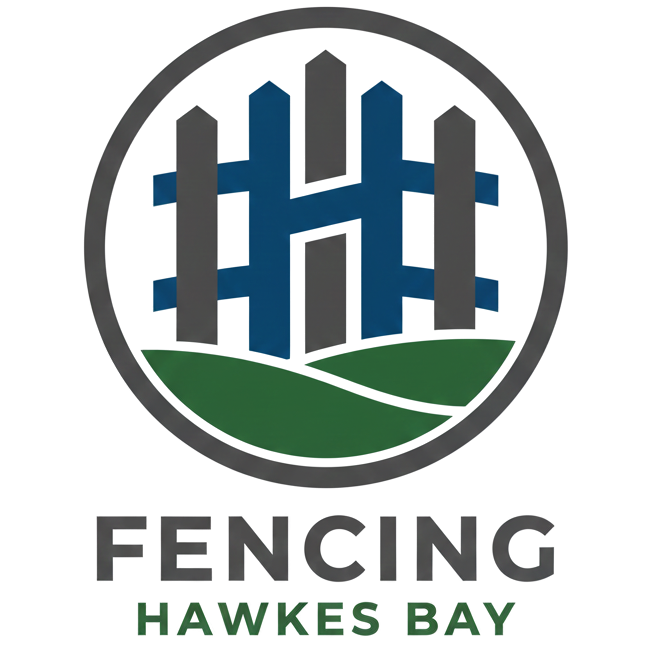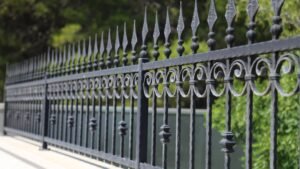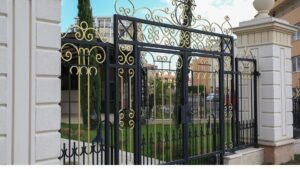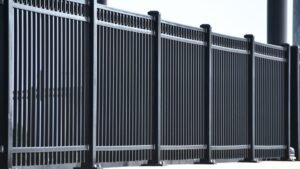Welcome to our in-depth guide on black metal fences and their costs. If you’re considering adding a stylish, durable black metal fence to your property, you’ve probably wondered, “Are black metal fences expensive?” In this post, we’ll break down everything you need to know about the costs involved, from the different types of metal fences available to installation expenses and long-term maintenance. Whether you’re looking for added security, curb appeal, or simply love the timeless look of a black metal fence, we’ll help you decide if it’s worth the investment. Let’s dive in and explore whether black metal fences are as costly as they seem.
On average, black metal fences cost between $20 to $35 per linear foot, depending on the material used. Wrought iron is typically the most expensive option, while aluminum offers a more affordable yet durable alternative. Installation costs can range from $30 to $70 per linear foot, based on the complexity and design of the fence.
Table of Contents
What Are Black Metal Fences?
Black metal fences are a stylish and durable fencing option that can enhance the curb appeal of any property. They are made from a variety of materials, with the most common being wrought iron, aluminum, and steel. Each of these materials offers its own benefits, contributing to the overall popularity of black metal fences.
Definition of Black Metal Fences
Black metal fences are typically constructed from materials like wrought iron, aluminum, or steel, each chosen for its unique properties. Wrought iron is known for its classic, ornate designs and exceptional strength, making it a favorite for homeowners seeking a traditional, elegant look. Aluminum fences, while lighter and more affordable, mimic the appearance of wrought iron but require less maintenance, as they are naturally resistant to rust. Steel, on the other hand, offers a balance between strength and affordability, providing durability without the premium price of wrought iron. Regardless of the material, black metal fences are typically coated with a protective finish, usually powder coating, to enhance their longevity and appearance.
Aesthetic Appeal and Versatility
One of the key reasons why black metal fences have gained widespread popularity is their aesthetic appeal. Their sleek, clean lines create a look that is both timeless and versatile, seamlessly blending with various architectural styles. Whether you have a modern home with minimalist design or a more traditional property with intricate detailing, black metal fences can complement both. The dark, neutral tone of black allows these fences to stand out as a striking feature without overpowering the overall look of the property. Their ability to suit both contemporary and classic homes makes them a highly sought-after choice for homeowners looking to elevate their property’s exterior design.
Durability and Strength
In addition to their visual appeal, black metal fences are well-known for their durability and strength. Wrought iron and steel, in particular, are celebrated for their ability to withstand harsh weather conditions and wear over time, making them a reliable, long-lasting option for fencing. Aluminum, while not as robust as steel or wrought iron, offers excellent rust resistance, making it a low-maintenance choice for areas prone to moisture. However, the strength and longevity of these fences often come with a higher price tag, particularly for wrought iron, which is labor-intensive to produce and install. Despite the cost, the investment in a black metal fence often pays off in terms of both durability and the boost it provides to a property’s aesthetic and security.
In summary, black metal fences are an excellent fencing option for those who value style, strength, and versatility. While they may come at a higher price than other fencing types, their long lifespan and ability to enhance the appearance of any property make them a worthwhile investment.

What Factors Affect The Cost Of Black Metal Fences?
When considering black metal fences, it’s essential to understand the various factors that influence their overall cost. By analyzing key components like material type, height, design, installation, geographic location, and potential permits, you can make a more informed decision about your fencing project.
Material Types
One of the most significant factors that determine the cost of a black metal fence is the type of material you choose. Each material comes with its own set of advantages, durability, and price point, influencing both the upfront and long-term costs.
Wrought Iron
Wrought iron is the most traditional and premium material choice for black metal fencing. Known for its superior strength, longevity, and timeless visual appeal, it’s often the most expensive option. Its durability makes it a solid investment, especially for homeowners looking for a fence that can withstand harsh weather conditions and offer long-term value. While its cost is higher upfront, the elegance and high-end look of wrought iron often justify the investment.
Aluminum
If you’re looking for a more affordable alternative that still offers durability, aluminum is a fantastic option. It is lightweight, resistant to rust, and requires less maintenance over time. Additionally, aluminum fences are weather-resistant, making them suitable for a variety of climates. While aluminum may not provide the same level of strength as wrought iron, its lower cost and ease of installation make it a popular choice for many homeowners.
Steel
Steel fences sit comfortably in the mid-range pricing category. Steel offers a combination of modern aesthetics and impressive strength. It’s more robust than aluminum but generally more affordable than wrought iron. Steel fences are also available in various designs, providing flexibility for those who want a strong yet stylish fence. However, steel may require additional maintenance over time to prevent rust, depending on the finish and coating.
Fence Height and Design
The height and design of your black metal fence significantly influence the total cost. Taller fences and those with intricate patterns or custom features typically come with a higher price tag.
Fence Height
Taller fences require more material, naturally driving up the cost. Additionally, higher fences may need reinforced posts or more labor-intensive installation, further increasing expenses. This is particularly true if the fence is intended for security purposes or to provide more privacy.
Custom Designs and Patterns
Fences with elaborate designs, such as decorative finials, scrolls, or custom patterns, will generally cost more than minimalist, simple designs. Customization adds to both the material and labor costs. On the other hand, opting for a straightforward, clean design without extra embellishments can make your fence more affordable while still delivering a sleek and modern appearance.
Installation Costs
Another critical factor to consider is the cost of installation, which can vary widely depending on several factors. Professional installation is the most common option, but some homeowners may choose to go the DIY route to save money.
Professional Installation
Professional installation is often the preferred choice for black metal fences, particularly because of the heavy materials and the precision required for proper alignment. Labor costs for professional installation depend on factors like the complexity of the terrain (e.g., sloping or uneven land), the fence’s length, and local labor rates. While this option is more expensive, professional installation ensures a high-quality finish and compliance with local building codes.
DIY Installation
Opting for DIY installation can save on labor costs, but it comes with its own challenges. Without the proper experience, the installation process can be time-consuming and may result in a less-than-perfect finish. Additionally, DIY installation may not be suitable for larger or more complex fence projects, particularly when dealing with heavy materials like wrought iron or steel. However, for smaller, more straightforward aluminum fences, DIY installation could be a viable option.
Geographic Location
Your geographic location can also play a significant role in the overall cost of a black metal fence. Prices for both materials and labor vary by region due to several factors:
Material Availability
In some areas, specific materials may be harder to source or more expensive due to shipping and manufacturing costs. For example, wrought iron may be more expensive in regions where it’s not locally produced, whereas aluminum or steel may be more readily available and affordable.
Labor Costs
Labor costs also fluctuate depending on where you live. In regions with higher costs of living or higher demand for skilled tradespeople, installation fees will typically be higher. Conversely, in areas with lower labor rates, you might find more affordable installation services.
Permits and Regulations
Finally, permits and regulations can add to the overall cost of your black metal fence, depending on local laws and requirements.
Permits
Some regions require permits for fences that exceed a specific height or for certain types of fencing materials. The cost of obtaining a permit can vary by location, and failing to secure one when needed could lead to fines or additional expenses down the line. It’s essential to check with your local authorities or homeowners’ association (HOA) to understand what permits are necessary before starting your fence project.
Regulations
Some neighborhoods or municipalities have regulations that govern the type, height, or placement of fences. These regulations can impact your choices and may limit certain customizations or designs. Ensuring that your fence complies with these regulations can prevent costly adjustments later.
In conclusion, understanding the factors that influence the cost of a black metal fence is crucial for planning your project and managing your budget. Material type, height, design complexity, installation methods, geographic location, and local regulations all play a significant role in determining the overall expense. By weighing these factors carefully, you can make informed decisions that balance your aesthetic preferences with your financial constraints.
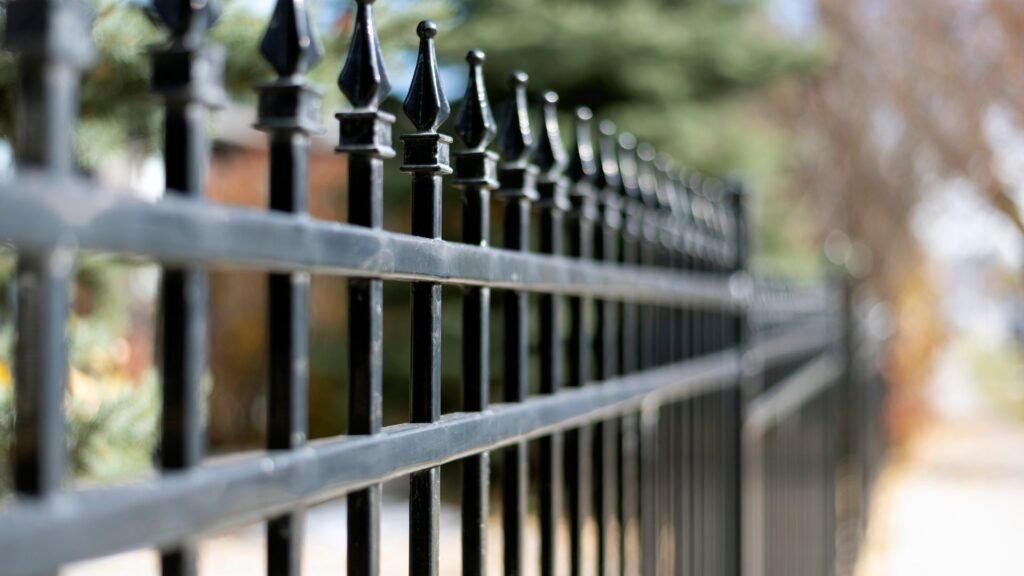
Price Breakdown: How Expensive Are Black Metal Fences?
When considering a black metal fence for your property, understanding the associated costs is crucial. These fences can offer an elegant and durable solution, but they come with a range of price points based on materials, installation, and additional features. Here’s a detailed breakdown to help you make an informed decision.
Average Costs per Material
The price of black metal fences largely depends on the material you choose. The most common options include wrought iron, aluminum, and steel, each offering different aesthetic and functional benefits.
- Wrought Iron: This premium material is known for its strength, durability, and classic appeal. Wrought iron fences typically cost between $25 to $35 per linear foot. While more expensive, these fences are highly durable and can last for decades with proper maintenance.
- Aluminum: Aluminum is a more lightweight and affordable option compared to wrought iron, yet it still provides a sleek, modern look. Expect to pay around $20 to $30 per linear foot for an aluminum fence. It offers excellent resistance to rust, making it a great choice for areas with high moisture levels.
- Steel: Steel is another durable option but is generally more affordable than wrought iron. Steel fences are priced between $15 to $25 per linear foot. Although steel can rust over time, it is still a cost-effective alternative that provides excellent strength and security.
Installation Costs
The price of installing a black metal fence goes beyond just material costs. Labor and the complexity of the installation play a significant role in the overall price. Installation can range from $30 to $70 per linear foot, depending on several factors:
- Height of the Fence: Taller fences require more material and labor, driving up the cost.
- Design Complexity: Ornate or custom designs can also increase installation costs due to the additional craftsmanship required.
- Terrain and Obstructions: Uneven ground or the need to work around existing structures can make installation more challenging and expensive.
Extra Costs
When budgeting for a black metal fence, it’s essential to account for potential additional expenses.
- Gates: Adding a gate to your fence can significantly raise costs. Simple gates may start at $500, while more intricate or larger gates can cost as much as $2000, depending on the material and design.
- Maintenance Costs: Over time, black metal fences may require maintenance, especially if they are made from wrought iron or steel. Regular painting or rust-proofing might be necessary to keep your fence looking its best. These maintenance tasks can add to the long-term cost of ownership, though aluminum fences generally require much less upkeep.
Comparison with Other Fence Types
To determine if black metal fences are truly expensive, it’s helpful to compare them to other common fence materials:
- Wood: Wood fences typically cost between $10 to $30 per linear foot, making them a comparable option to black metal fences in terms of price. However, wood requires regular maintenance, including staining or sealing, to prevent rot and insect damage, which can add to the overall cost over time.
- Vinyl: Vinyl fences are priced similarly to black metal options, ranging from $20 to $40 per linear foot. Vinyl is a low-maintenance option, but it lacks the same durability and strength as metal.
- Chain-Link: If you’re looking for an economical option, chain-link fences are generally the most affordable, with prices ranging from $5 to $15 per linear foot. However, they offer minimal privacy and aesthetic appeal compared to black metal fences.
In summary, black metal fences can be considered more expensive than other fencing options like chain-link or wood, especially when opting for high-end materials like wrought iron. However, their durability, timeless appearance, and long-term value make them a worthy investment for many homeowners. By understanding the various costs involved—including materials, installation, and maintenance—you can determine if a black metal fence is the right choice for your property.
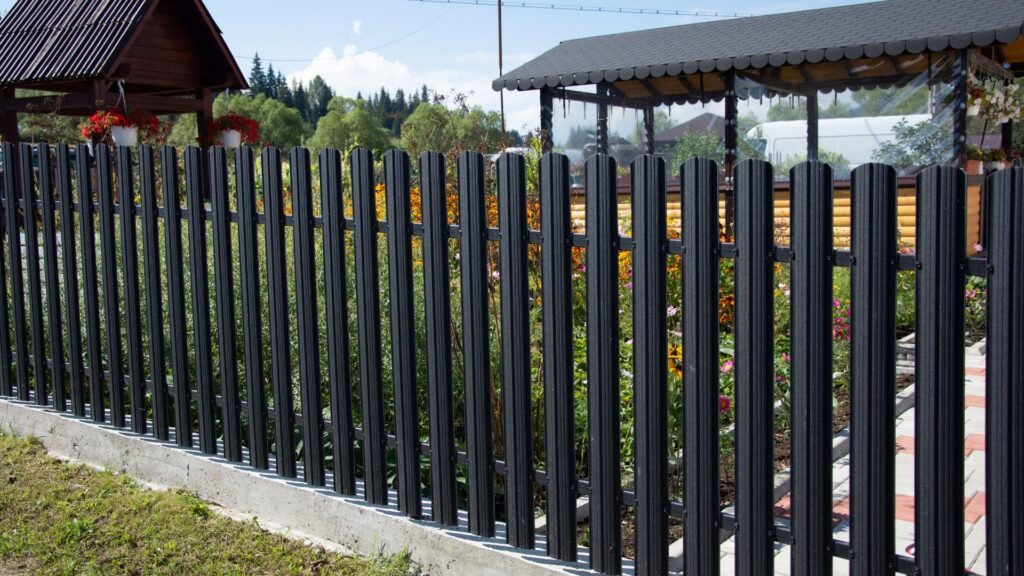
Are Black Metal Fences Worth The Investment?
When it comes to choosing a fence for your property, the decision often comes down to durability, security, aesthetics, and long-term value. Black metal fences, whether made from aluminum, steel, or wrought iron, offer a unique blend of these qualities, making them an increasingly popular choice among homeowners. Below, we’ll explore the key reasons why investing in a black metal fence is a smart decision.
Durability: Built to Last
One of the standout features of black metal fences is their exceptional durability. Unlike wood, which can warp, rot, or suffer from insect damage over time, or vinyl, which can crack or fade, metal fences can last for decades with proper care. While all metal fences are durable, aluminum and wrought iron are especially robust. With periodic maintenance, such as cleaning and repainting, these fences can easily outlast other materials, saving you from costly replacements in the long run.
Enhanced Security
Security is often a top concern for homeowners, and black metal fences provide an unmatched level of protection. The inherent strength of metal serves as a powerful deterrent to intruders, offering a more secure barrier than wooden or vinyl alternatives. Metal fences are difficult to break or cut through, making them a reliable choice for those seeking peace of mind. For homes in areas where security is a priority, a black metal fence can offer both safety and sophistication.
Boosting Curb Appeal and Property Value
A black metal fence doesn’t just offer functional benefits; it can also significantly enhance the curb appeal of your property. The sleek, elegant appearance of a black metal fence complements various architectural styles, from modern to traditional. This aesthetic appeal can be a major selling point for your home, increasing its overall value. Real estate experts often highlight the importance of first impressions, and a well-maintained black metal fence can give your property the polished look that potential buyers are seeking.
Low Maintenance Costs, Especially with Aluminum
One of the most attractive aspects of black metal fences, particularly aluminum fences, is their low maintenance needs. Unlike steel or wrought iron, aluminum is naturally resistant to rust, making it ideal for areas with high humidity or coastal climates. Aluminum fences typically require only occasional cleaning and inspection, with no need for the constant repainting or sealing that wooden fences demand. This minimal upkeep can save homeowners both time and money over the years, further increasing the return on investment.
Increased Resale Value
For homeowners considering selling their property in the future, installing a black metal fence can provide an extra selling point. Potential buyers are often drawn to homes that have durable, stylish, and secure fences already in place. A black metal fence adds a layer of sophistication and ensures that prospective buyers won’t have to worry about replacing or maintaining the fence anytime soon. In competitive real estate markets, this can make all the difference in attracting serious offers.
In summary, black metal fences offer a range of benefits that make them worth the investment. Their durability, security, and low maintenance needs make them a practical choice, while their aesthetic appeal and ability to boost property value make them a stylish addition to any home. Whether you’re looking to enhance your property’s security, improve its appearance, or increase its resale value, a black metal fence is an investment that will continue to pay off for years to come.
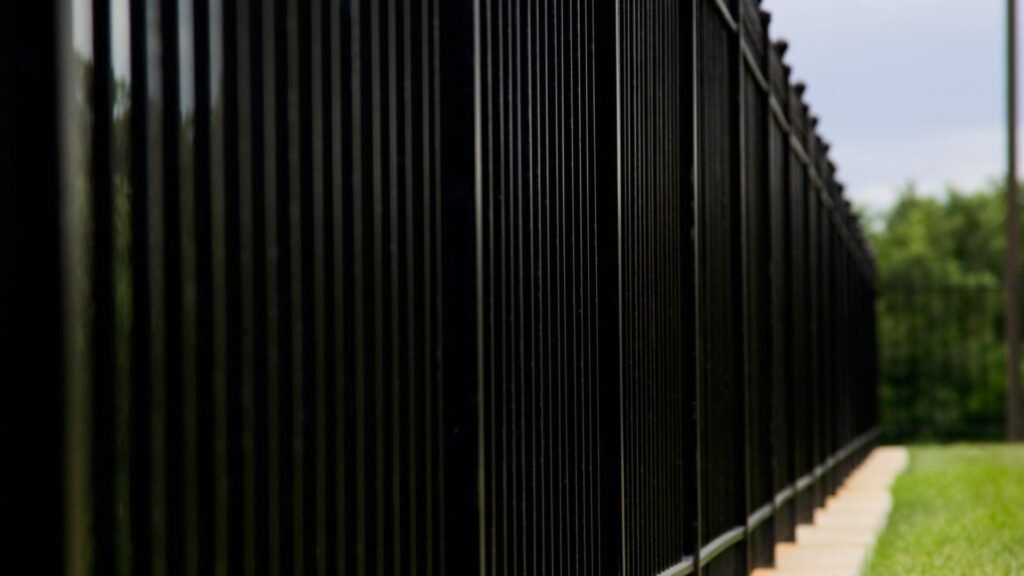
Affordable Alternatives And Ways To Save On Black Metal Fencing
Black metal fencing adds both elegance and security to any property, but its costs can sometimes feel prohibitive. However, with a bit of strategic planning, you can achieve the same stylish, durable look without breaking the bank. Here are several cost-saving alternatives and tips to help you install black metal fencing on a budget without sacrificing quality.
1. Material Alternatives
One of the biggest factors influencing the price of black metal fencing is the material. Fortunately, you can get a similar aesthetic for a lower cost by considering these alternatives:
- Aluminum Over Wrought Iron: While wrought iron is a traditional choice for black metal fencing, it can be expensive due to its heavy-duty nature and labor-intensive manufacturing process. Opting for aluminum provides a comparable sleek look while being lighter and more affordable. Additionally, aluminum is naturally resistant to rust and corrosion, reducing maintenance costs over time.
- Powder-Coated Steel: For homeowners who love the robust feel of wrought iron but want something more budget-friendly, powder-coated steel is an excellent alternative. It offers the same strength and durability as iron but at a lower price point. The powder-coating process also makes the steel highly resistant to rust and environmental wear, giving it the appearance of wrought iron but with longer-lasting protection.
2. Simple Designs
The intricacy of your fence design can significantly influence the total cost. Custom, ornate designs might be visually stunning but will push up your budget. Here’s how to save without compromising style:
- Opt for Simple or Prefabricated Designs: If you’re looking to reduce costs, consider choosing minimalist or prefabricated designs. These are often less expensive to manufacture and install, as they require fewer specialized materials and less time. A clean, modern design can still provide a sophisticated look without the hefty price tag of custom work.
3. Partial Fencing
Another way to reduce costs is to fence only the most important areas of your property. Complete perimeter fencing can be expensive, but you can still create privacy and security without enclosing the entire yard.
- Fence Key Areas: Consider fencing only the front yard or backyard, depending on your priorities. For instance, fencing the front yard can increase curb appeal, while fencing the backyard offers privacy and a safe space for children or pets. By choosing to only fence a portion of your property, you can significantly cut costs while still getting the benefits of black metal fencing.
4. Consider DIY Installation
Labor costs can add up quickly when installing a black metal fence, so taking a hands-on approach might help you save a substantial amount of money. However, this route is not without its challenges.
- Potential Savings and Challenges of DIY Installation: If you have some experience with home improvement or outdoor projects, DIY installation can be an excellent way to reduce costs. However, it’s important to consider the challenges involved. Installing a metal fence requires precision, especially when setting the posts, aligning panels, and ensuring everything is level. You’ll need the right tools and a solid understanding of local building codes. But if you’re up for the task, doing it yourself could save you hundreds, if not thousands, of dollars in labor fees.
5. Shopping Around
Lastly, don’t settle for the first contractor or supplier you come across. Comparing prices and looking for deals can help you find the best offer available.
- Compare Contractor Quotes: Reach out to multiple contractors to get a range of quotes. Prices can vary widely depending on the company, the scope of work, and your location. By comparing several offers, you increase your chances of securing a deal that fits your budget.
- Wholesale and Bulk Retailers: Additionally, consider purchasing materials from wholesale or bulk retailers. These suppliers often offer discounts for buying in larger quantities, which can help you lower your material costs. Even if you’re not installing the fence yourself, many contractors will allow you to supply the materials, which can lead to even more savings.
Installing a black metal fence doesn’t have to drain your finances. By carefully selecting alternative materials, opting for simpler designs, fencing only key areas, considering DIY installation, and shopping around for the best deals, you can enjoy the benefits of a stylish and durable fence without overspending. With these strategies, you’ll be able to strike a perfect balance between aesthetics, functionality, and affordability, all while enhancing your property’s value.
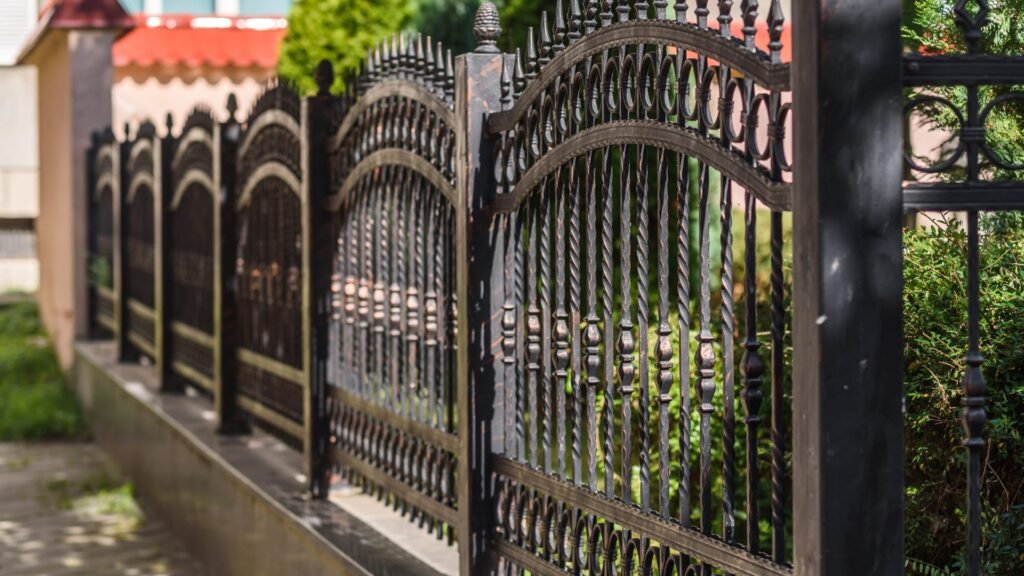
Long-Term Maintenance And Cost Considerations
When choosing a black metal fence, it’s essential to consider the long-term maintenance and costs involved. Black metal fences, whether made of wrought iron, steel, or aluminum, are known for their durability, aesthetic appeal, and strength. However, like any outdoor structure, they require proper care to maintain their condition and look over time. In this section, we’ll explore key factors such as rust prevention, cleaning, inspection, and maintenance costs, as well as the importance of warranties in ensuring the fence’s longevity.
Rust Prevention and Paint
Rust is one of the most significant concerns for metal fences, especially wrought iron, which is prone to oxidation over time. To mitigate rust, regular maintenance is crucial. Applying rust-proof coatings or paint can be an effective solution to extend the lifespan of the fence and keep it looking as good as new. Here’s how:
- Regular Repainting: One of the simplest and most effective ways to prevent rust is through regular repainting. A quality paint not only enhances the aesthetic appeal of the fence but also provides a protective barrier against moisture, which is a leading cause of rust. It is recommended to repaint your black metal fence every 2-3 years, depending on weather exposure.
- Rust-Proof Coatings: In addition to paint, using specialized rust-proof coatings can significantly increase the fence’s resistance to rust. These coatings are designed to form a durable layer that seals the metal surface, preventing rust from forming even in harsh weather conditions. Products like zinc-rich primers or epoxy-based coatings are commonly used to provide additional protection, especially in high-humidity areas.
By staying proactive with rust prevention methods, you’ll not only maintain the beauty of your metal fence but also avoid more extensive repairs or replacements down the road.
Cleaning and Inspection
Regular cleaning and inspection are key to prolonging the life of a black metal fence. Dirt, debris, and moisture can accumulate over time, which could accelerate rust formation and deterioration if left unchecked. Here are some practical tips for keeping your fence in optimal condition:
- Cleaning: It’s advisable to clean your metal fence at least twice a year. A mild detergent mixed with water and a soft brush can be used to scrub away dirt and grime. For tougher stains or buildup, a power washer may be employed, but with caution to avoid damaging the paint or protective coating.
- Inspection: While cleaning, take the opportunity to inspect the fence for any signs of damage, rust, or wear. Check for loose screws, weak points in the structure, or areas where the coating may have chipped off, exposing the metal beneath. Catching these issues early will help prevent further damage and costly repairs.
- Address Minor Rust Immediately: If you notice any rust spots starting to form, it’s essential to address them right away. Sand the affected area to remove the rust and apply a rust-inhibitive primer before repainting. This small action can save you from more significant rust problems in the future.
Proper cleaning and inspections can add years to the life of your metal fence, keeping it looking its best and functioning properly.
Maintenance Costs Over Time
Understanding the long-term maintenance costs of black metal fences is important when comparing them to other materials such as wood or vinyl. While black metal fences tend to have a higher upfront cost, their long-term maintenance costs can be relatively low, especially when properly cared for.
- Annual Maintenance Costs: On average, homeowners can expect to spend around $100 to $200 annually on maintenance for a black metal fence. This typically includes paint touch-ups, rust treatment, and cleaning supplies. If you hire a professional for cleaning or painting, these costs may be higher, ranging from $300 to $500, depending on the size and condition of the fence.
2. Comparison to Other Fencing Materials:
- Wood Fences: Wood fences, while initially cheaper, require more frequent maintenance. This includes regular staining, sealing, and replacing damaged or rotting sections. Annual maintenance for wood fences can range from $200 to $600.
- Vinyl Fences: Vinyl fences require less maintenance compared to metal or wood but may still incur costs for occasional cleaning or replacing broken panels. Annual maintenance costs for vinyl are typically lower, around $50 to $150, but they can become more expensive if repairs are needed.
In the long run, the relatively low maintenance costs of black metal fences, combined with their durability, make them a smart investment, particularly for homeowners seeking a low-maintenance, long-lasting option.
Warranty and Longevity
Investing in higher-quality materials for your black metal fence can provide substantial benefits, particularly when it comes to warranties and longevity. Many manufacturers offer warranties on premium metal fences, which can range from 10 years to a lifetime, depending on the material and finish.
- Higher-Quality Materials: Choosing a fence made from high-grade steel, aluminum, or wrought iron often comes with a longer warranty. These materials are designed to withstand harsh environmental conditions, such as extreme temperatures and moisture, and typically require less frequent repairs or replacements.
- Warranties: Warranties often cover structural integrity, rust prevention, and paint or finish defects. By investing in a fence with a robust warranty, you can ensure that any issues that arise over time will be covered, saving you money on repairs and replacements.
- Long-Term Durability: Black metal fences, particularly those made of wrought iron or powder-coated steel, can last for decades when properly maintained. The longevity of these fences makes them a worthwhile investment, as they are built to endure wear and tear for generations, unlike wood fences that may need complete replacement after 15-20 years.
In conclusion, while black metal fences require some level of maintenance, proper care and investment in quality materials can significantly reduce costs over time and ensure the fence remains a beautiful and functional part of your property for many years.

FAQs: About Are Black Metal Fences Expensive
Are black metal fences more expensive than wood fences?
Yes, black metal fences are generally more expensive than wood fences. While wood fences can cost around $10 to $30 per linear foot, black metal fences, depending on the material (wrought iron, aluminum, or steel), can range from $20 to $35 per linear foot. However, metal fences typically require less maintenance and last longer, which can make them a better investment in the long run.
How long do black metal fences typically last?
Black metal fences, especially those made from wrought iron or aluminum, can last for several decades if properly maintained. Wrought iron can last up to 50 years or more with proper care, while aluminum, due to its rust-resistant properties, can last 20-30 years with minimal upkeep.
Can I install a black metal fence myself to save money?
Yes, installing a black metal fence yourself can save on labor costs, which typically range from $30 to $70 per linear foot. However, DIY installation can be challenging, especially with heavier materials like wrought iron, and may require specific tools and expertise to ensure the fence is secure and durable.
How often do black metal fences need to be repainted or maintained?
Wrought iron fences should be repainted every 2-3 years to prevent rust and maintain their appearance. Aluminum fences, on the other hand, are typically powder-coated and don’t require painting, but occasional cleaning and inspections for damage are recommended to keep them in top condition.
Is aluminum a good alternative to wrought iron for black metal fences?
Yes, aluminum is an excellent alternative to wrought iron. While it may not be as strong as wrought iron, aluminum is lightweight, resistant to rust, and generally more affordable. It still offers a sleek, modern look and requires less maintenance over time, making it a practical option for homeowners.
What factors influence the cost of black metal fences?
Several factors affect the cost of black metal fences, including the type of metal (wrought iron, aluminum, or steel), the height and design of the fence, installation complexity, geographic location, and whether any additional features like gates or custom designs are included.
Can black metal fences increase property value?
Yes, black metal fences can enhance property value by boosting curb appeal and providing added security. Their durability and aesthetic appeal can make a home more attractive to potential buyers, especially if the fence complements the property’s style.
What is the most affordable type of black metal fence?
Aluminum is generally the most affordable type of black metal fence, costing around $20 to $30 per linear foot. It’s lightweight, resistant to rust, and requires less maintenance compared to wrought iron, making it a cost-effective option for homeowners who want the look of metal without the high price.
Are there any maintenance costs associated with black metal fences?
Yes, maintenance costs for black metal fences depend on the material. Wrought iron fences may require repainting and rust prevention treatments every few years, which can cost around $5 to $10 per linear foot. Aluminum fences typically have lower maintenance costs, with only occasional cleaning and inspection needed.
Do black metal fences come with warranties?
Many manufacturers and contractors offer warranties for black metal fences, especially for aluminum and powder-coated steel options. Warranties can range from 10 years to a lifetime, depending on the material and manufacturer, providing peace of mind regarding the fence’s durability and performance over time.
Conclusion
In conclusion, black metal fences, while potentially more expensive upfront compared to other materials, offer significant long-term benefits in terms of durability, aesthetics, and low maintenance costs. It’s important to carefully weigh these initial costs against the value they provide over time, considering factors like enhanced security, curb appeal, and reduced upkeep. By taking the time to research, obtain quotes from local contractors, and explore different material options, you can make a well-informed decision that best suits your needs and budget.
About the Author:
Mike Veail is a recognized digital marketing expert with over 6 years of experience in helping tradespeople and small businesses thrive online. A former quantity surveyor, Mike combines deep industry knowledge with hands-on expertise in SEO and Google Ads. His marketing strategies are tailored to the specific needs of the trades sector, helping businesses increase visibility and generate more leads through proven, ethical methods.
Mike has successfully partnered with numerous companies, establishing a track record of delivering measurable results. His work has been featured across various platforms that showcase his expertise in lead generation and online marketing for the trades sector.
Learn more about Mike's experience and services at https://theleadguy.online or follow him on social media:
